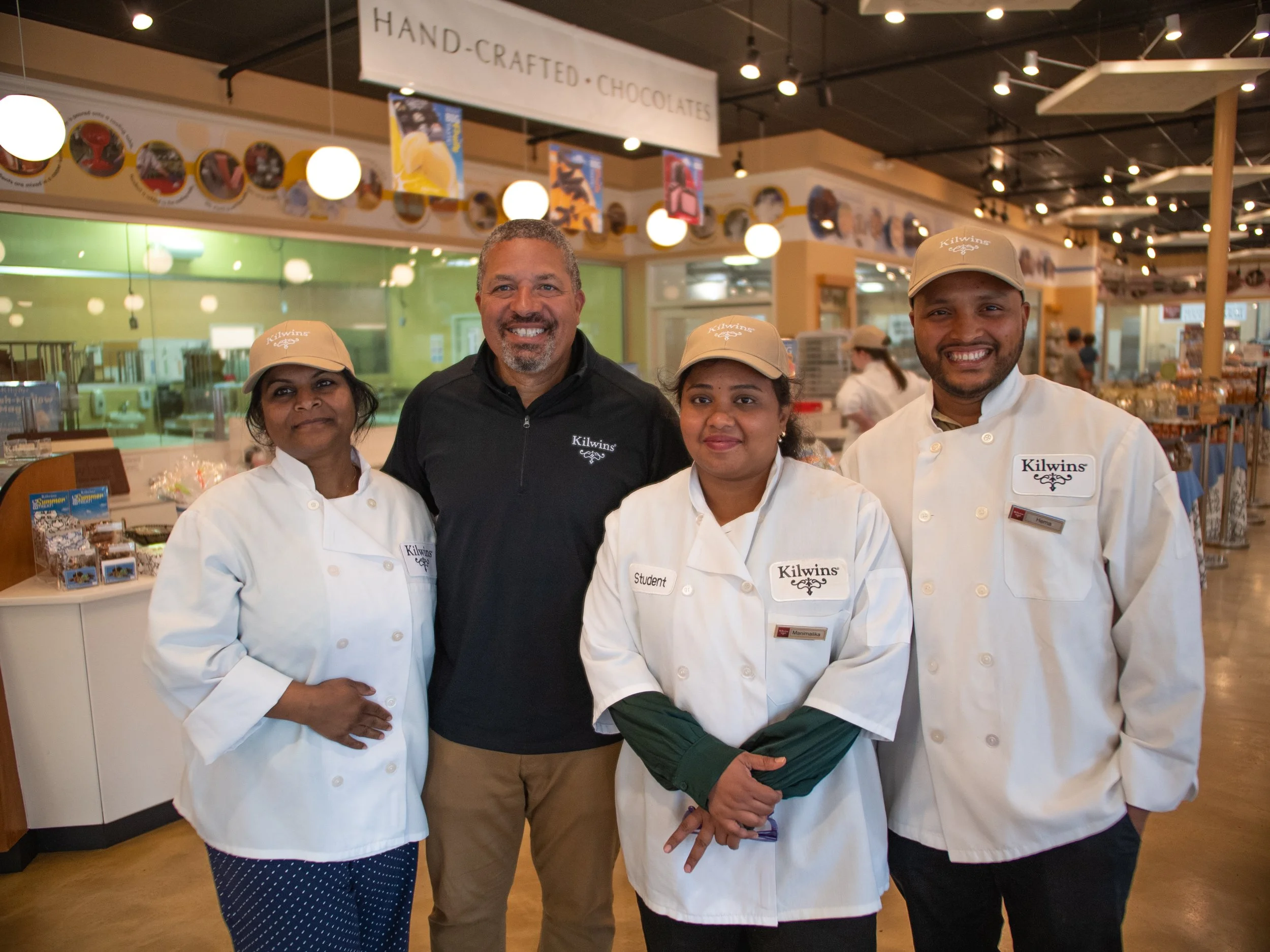Brian Britton
Chief Executive Officer, Kilwins Chocolates Franchise, Inc.
Beyond the Article: Hear the full exclusive interview with Kilwins CEO Brian Britton on the VCEO Podcast for his personal insights on Grit and Leadership.
Kilwins CEO's Sweet Recipe: Military to Civilian Career Success
Planning, Education, Mentorship, Networking, Grit, and Prayer

Pride and Planning: A Soul-Searching Journey
From commanding combat aircrews to leading a sweet empire: Kilwins CEO Brian Britton's career transition from the military was more than a career change; it was a soul-searching journey. “I thought I was going to make a career out of the Navy and was looking forward to doing that… but I had this itch. There was something that was telling me, ‘maybe you're supposed to go out and lead in some other way,’” Brian said.
Deliberately seeking input from friends, family, and mentors helped Brian understand his motivations and ensured he was clear on why he was ready to leave the military. Addressing the delicate balance between preparation and decisive action, Brian also cautions about a common pitfall known as 'analysis paralysis', or overthinking to the point of not being able to make a decision. "I realized because I wanted to lead, part of what I needed to do was to plan how I was going to lead outside of the Navy."
By knowing that he wanted to lead in business, Brian was then able to focus on the next task at hand: getting the best business education possible.
The Organic Approach to Mentorship and Networking is a key component of a successful career transition. Brian, for example, benefited from mentors who had recently transitioned from the military to Harvard Business School, guiding him through the application process and campus life. Networking remained vital as he graduated from Harvard and began working at Disney. He advises transitioning service members, Veterans, and their family members to organically seek out people they can learn from, rather than relying strictly on formal requests. “Instead of finding mentors, I would find people who like to teach.”
Brian also emphasizes the importance of learning from people in their own environment: "I would do things like, 'Hey, can I just shadow you for like an hour or two and watch what you do in the theme parks? I'll come to your territory.’”
Brian views networking as a result of ethical business practices and helping others.“I found that the right mentor relationships were with people who poured into me more than I poured into them, but I was still intentional about giving back.”
Joining professional groups and attending industry conferences can open doors, while connecting people within your network builds trust and credibility. After detailing how planning, education, mentorship, and network building all played vital parts in his transition, Brian highlighted that the process, even with the best possible outcomes, still requires time, patience, and a skill military members and their families are uniquely equipped with: Grit.
The Role of Education was the next critical step, and Brian had his sights set on one school in particular: Harvard. Recognizing gaps in his business knowledge, Brian took night classes in accounting and statistics while still in the Navy to build the necessary foundation to be competitive at Harvard. "It paid off big time, I can’t imagine not doing that,” said Brian. “Everybody else had been out in the business world for five years or so, and I had been leading for five-plus years, longer than that, but I didn't have that business background to fall back on, and that was critical as part of my plan.”
After being accepted to Harvard, Brian found he could learn from more than just what was being taught in the classrooms. His classmates came from all kinds of business backgrounds, and he would constantly ask them for their experiences while sharing his leadership experiences from the military with them. "I think the biggest thing was I had no idea how many types of different careers were even available out there. There were people doing startups, people who work in corporate America, people who were consulting, people who were going into big nonprofits, people going to education, people going into international business, people who were going to, like, develop a franchise," said Brian. "For me, it really was sort of a dual education. I was learning about business, but I was also learning about the business world."
Learning from his classmates was more than just beneficial for Brian’s education; it also helped him learn more about Networking and Mentorship.
The Power of Grit can be thought of in many different ways, and the way Brian approaches it is as something many Veterans already possess. He notes that while a Veteran may have less knowledge and experience in a civilian job at first, with a little grit, it's possible to catch up really fast. Brian says the benefit of this is how Veterans are already used to doing the hard work. Thus, by the time they catch up to their civilian counterparts in the knowledge and skills of their civilian job, their military experience positions them to even launch themselves ahead of their peers.
For Brian, while at Disney, he found his grit when he had to learn how all the different parts of the business worked together, recognizing that no role or detail was too unimportant for his attention. "I would get into, quote unquote, costume and work alongside our frontline cast members, and do the tasks and duties. And by doing that, you quickly learn the business."
By acknowledging the areas of knowledge he didn’t have and then having the grit to learn as much as possible, Brian highlights another element crucial to his transition from the military into civilian leadership: prayer.
Faith and Decision-Making are foundational to Brian’s decision-making process. He relies on faith to guide his choices, seeking a sense of peace when making major decisions. “I try not to make any decision that I don't feel that I'm called to do. I want to be called to something.”
For Brian, peace does not mean the absence of difficulty but rather a deep conviction that he is on the right path, even when the journey is challenging. “I found that when I was right on the cusp of making a decision, if I felt at peace with that decision, then I really knew it was the right one. And if I didn't feel peace, I had a sense of angst that, for me, I knew it wasn't the right one, and God's probably pointing me in a different direction.”
When navigating a tough transition, Brian wouldn't just focus on his skills and talents, but also his desire and vision. He would then listen to his friends and mentors, and through prayer, he was able to identify what areas gave him the most peace.
Advice for Transitioning Service Members, Veterans, and their families considering a career transition is to view the civilian world as full of opportunity. He encourages Veterans to explore different paths, accept that there will be stumbles, and consider entrepreneurship or franchising as viable options. With the right plan, education, mentorship, network, grit, and faith, Brian proves that a successful transition and a fulfilling second career are within reach.




